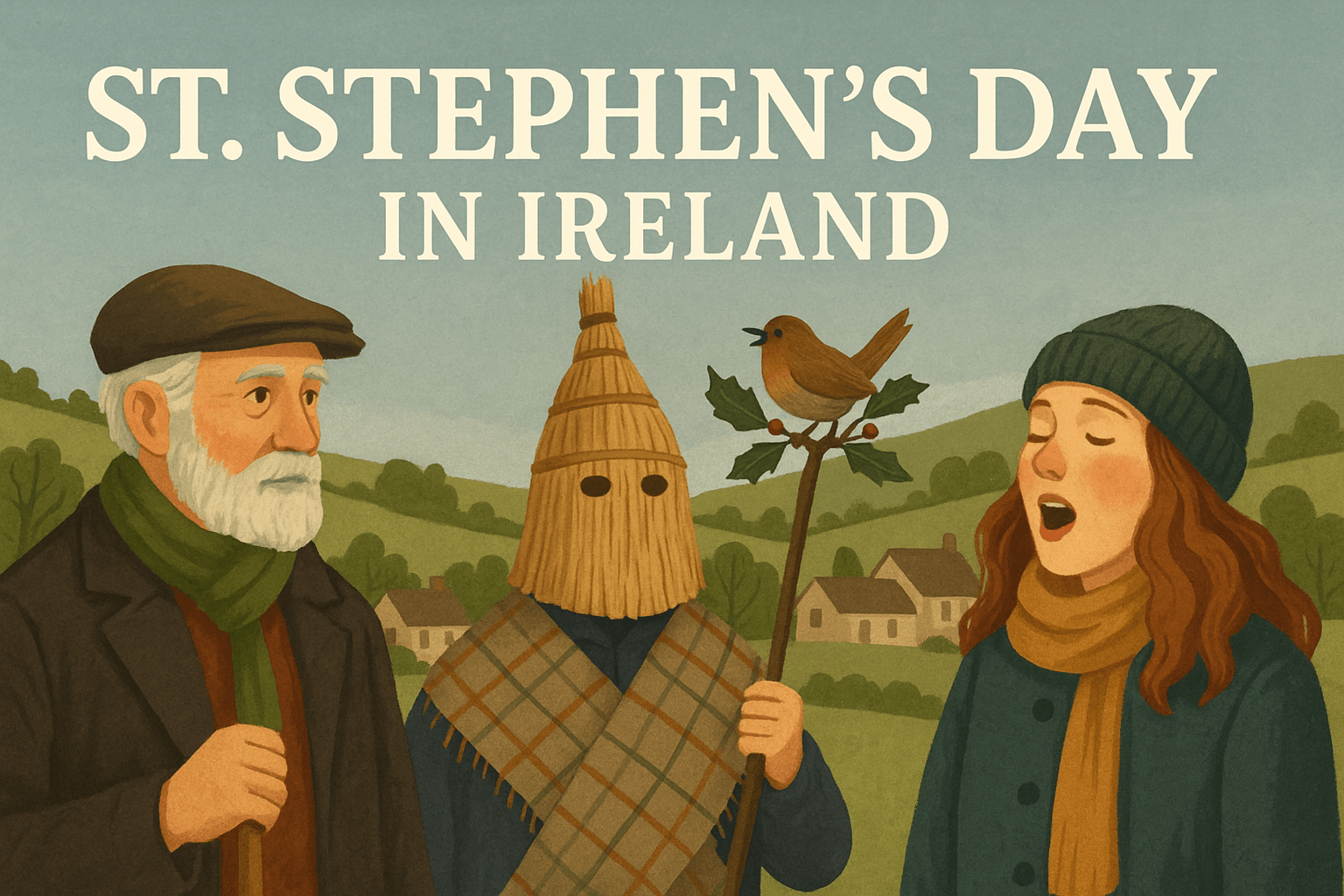In Ireland, the day after Christmas is known as St Stephens Day (December 26th). While other countries call it Boxing Day, in Ireland the holiday carries its own unique blend of history, folklore, and cultural traditions. From the legendary Wren Boys processions to the festive gatherings of families and friends, St Stephens Day remains a special occasion that reflects Ireland’s deep sense of community and storytelling.
But beyond the parades and celebrations, St Stephens Day also offers us an opportunity to explore Ireland’s cultural identity—especially through the Irish language (Gaeilge). Just as Christmas traditions are filled with greetings and blessings, many Irish families still use festive Gaelic phrases to mark the day.
In this article, we’ll explore the origins of St Stephens Day, the customs that make it uniquely Irish, and how learners of Irish can enrich their celebration with language.
The Origins of St Stephens Day
St Stephens Day commemorates Saint Stephen, regarded in Christian tradition as the first martyr. His feast day has been celebrated on December 26th for centuries across Europe. In Ireland, however, it took on unique characteristics shaped by folklore, rural life, and local identity.
According to legend, a wren bird betrayed St Stephen, leading to his capture and martyrdom. This tale gave rise to one of Ireland’s most unusual folk traditions—the Wren Boys.
The Wren Boys Tradition
On St Stephens Day, groups of young people—called Wren Boys—would once dress in straw costumes or masks, parade through villages, and sing songs about “hunting the wren.” Traditionally, they carried a pole decorated with holly and a captured (or symbolic) wren, going door-to-door to collect donations.
Though the custom of capturing real birds has faded, many communities in rural Ireland still mark St Stephens Day with Wren Day parades, music, and dancing. It’s a vibrant example of how folklore and festivity combine in Irish culture.
Key features of Wren Day include:
- Costumes: Straw hats, painted faces, or colorful outfits.
- Music: Traditional Irish instruments like the bodhrán and tin whistle.
- Community Spirit: Funds collected often go toward local charities or community projects.
This blending of myth, faith, and fun makes St Stephens Day feel distinctly Irish.
St Stephens Day in Modern Ireland
Today, St Stephens Day is a time for:
- Family Gatherings: Many households enjoy another festive meal and exchange small gifts.
- Sporting Events: Football and horse racing are especially popular.
- Social Outings: Pubs and music sessions come alive with holiday cheer.
- Community: Parades and charity events keep the day connected to its folk roots.
Unlike the quieter reflection of Christmas Day, St Stephens Day has an outward, social energy. It’s about neighbors, friends, and communities coming together.
Irish Language and St Stephens Day
Holidays are a wonderful opportunity to practice the Irish language. On St Stephens Day, you’ll hear many traditional greetings and expressions in Irish. Here are a few to add to your vocabulary:
- Lá Fhéile Stiofáin sona duit! – Happy St Stephen’s Day to you!
- Nollaig shona agus athbhliain faoi mhaise daoibh! – Merry Christmas and a Happy New Year to you all!
- Go maire tú an lá! – May you enjoy the day!
Learning simple greetings like these helps keep Gaeilge alive in holiday traditions. If you’re new to Irish, check out our Basic Irish Conversation Guide for easy ways to get started.
Why St Stephens Day Matters
St Stephens Day is more than just a “day after Christmas.” It captures several themes that resonate with Ireland’s history and culture:
- Community: The Wren Boys tradition emphasizes local unity.
- Folklore: Myths about the wren connect ancient beliefs to Christian stories.
- Language: Irish phrases and songs keep cultural memory alive.
- Celebration: Sport, music, and food showcase Ireland’s joy for life.
For learners of Irish, engaging with these traditions adds a deeper dimension to studying the language—it connects words to lived experience.
How to Celebrate St Stephens Day (Wherever You Are)
Even if you’re not in Ireland, there are ways to honor the spirit of St Stephens Day:
- Learn a Wren Song: Traditional verses often include Irish words and folk rhythms.
- Cook an Irish Meal: Leftover turkey and ham are staples on December 26th.
- Practice Greetings in Irish: Even one or two phrases can enrich the celebration.
- Support a Cause: Like the Wren Boys’ collections, donate to a local charity.
- Read About Irish Folklore: Our Ancient Irish Language Guide is a great place to start.
St Stephens Day and the Irish Calendar
The day also has a place within the broader Gaelic calendar of feasts and festivals. Unlike ancient celebrations such as Bealtaine or Samhain, St Stephens Day is rooted in Christian tradition, yet it absorbed older folk elements. This blending of old and new is typical of Irish culture—where pagan, Christian, and modern influences often overlap.
For learners, understanding the calendar gives context to many Irish phrases and sayings, which often refer to feast days or seasonal changes.
Final Thoughts
St Stephens Day may fall in the shadow of Christmas, but in Ireland, it’s a day with its own special spirit. From the colorful Wren Boys to the warm greetings in Gaeilge, the holiday connects history, folklore, and language.
Whether you celebrate with music, sport, or simply by learning a new Irish phrase, you’re participating in a tradition that has lasted for centuries.
👉 If you’d like to carry the spirit of St Stephens Day into your own learning journey, you can start exploring Irish with Gaeilgeoir AI and join a worldwide community of learners keeping the language alive.


